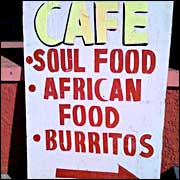Home / Issues / The new America
The new America
America is in the midst of a historic demographic shift that represents an enormous opportunity, and challenge, for Unitarian Universalists.
This historic change represents an enormous opportunity and challenge for us. Frankly, this new multicultural America exposes the greatest weaknesses of our movement.
Think for a moment about the change in our professional ministry in the last twenty-five years. Twenty-five years ago there were few women ministers. Today most ministers are women and their majority is growing. Twenty-five years ago there were only a handful of ministers who were openly gay or lesbian. Today gay and lesbian ministers are everywhere.
Yet during this time the number of minority ministers has changed hardly at all. What is even more troubling, ministers from historic minorities have had great difficulty finding and keeping positions. Why is it that in a generation the situation of women and lesbians and gays in our ministry has changed dramatically while the situation of ethnic and racial minorities has changed hardly at all?
Clearly, the barriers of culture, class, and race are much more difficult for us to overcome than the barriers of gender and sexuality. When we look more closely at the change in our professional ministry, we see that the vast majority of women, gays, and lesbians admitted were middle class, well-educated people of European descent.
I have come to believe that the barriers of culture and social class are even more difficult than the barrier of race. We have seen this in our nation with the election of Barack Obama and in our UU movement with the election of the Rev. William G. Sinkford and myself to the presidency. Each of us is less threatening to the dominant culture because we are the products of elite educations and have spent our lives in the dominant culture. If Barack Obama sounded like a poor urban African American he could not have been elected. If I sounded like San Antonio’s West Side barrio, I would not have been minister at a large congregation, much less president of our Association.
This great challenge of culture and class is ultimately a religious, moral, and spiritual issue rather than a social justice issue. Perhaps the great challenge for us as individuals, as congregations, and as a religious movement is whether we can learn to understand, accept, include, and ultimately love our neighbors who are different from us.
Let’s not kid ourselves. This will not be easy. I believe we need to begin by acknowledging that it is hard for us. Then I think we need to pay attention to the diversity that is already among us. Let’s recognize it, lift it up, celebrate it, include it. We also need to learn from one another. Some of our congregations are much further down the road of multiculturalism. We can and must learn from them. We can also learn from the UUs in foreign lands like India, Africa, and the Philippines.
We can do this. Our theology is inherently open to gifts of many cultures. When we truly engage the people and cultures around us we are transformed. There is joy and discovery on this journey. Let’s set out together.








